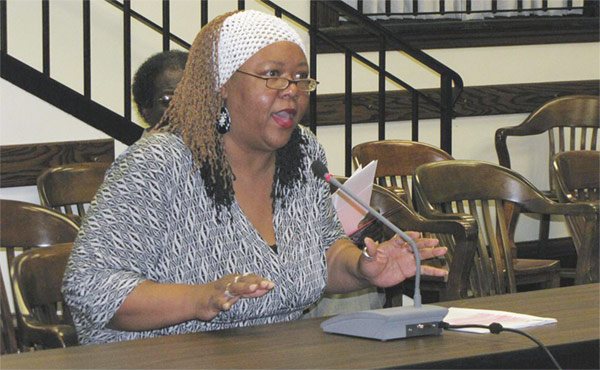At the monthly Pittsburgh Board of Education public hearing Jan. 11, 13 members of the Black Political Empowerment Project and the Coalition Against Violence asked the board to implement CAV’s strategies in the Pittsburgh Public School District.
| A MOTHER’S LOVE— Valerie Dixon shares the story of her son who died, a victim of street violence. |
“It is the strongly held opinion of members of B-PEP and the Coalition Against violence ‘Working Group’ that the end of violence in our schools and in our neighborhoods must become a top priority for the Pittsburgh Public Schools, its teachers, administrators, students, parents and guardians,” B-PEP Chairman Tim Stevens said. “Please remember that more peaceful schools and more peaceful communities logically lead to a more positive learning environment for all.”
The members illustrated the cycle of violence wherein a poor education can lead to violent behavior and violent behavior can lead to a poor education. They also explained how violence in schools has affected other areas of the city by making the district unappealing and therefore causing population decline.
“I see the parallels between violence in our streets and violence in our schools. The parallels are it can stifle and stymie the growth and development in our schools,” said Ernest Bey, a member of the Coalition Against Violence. “Safety being one of the most basic tenets, we know that some families have fled the district because of violence.”
CAV’s “Strategies for Change: The Full Document” contains more than 300 strategies for many different sectors of society including the school systems. Among the strategies specifically mentioned at the hearing were taking a public health approach to violence, establishing peer-mentoring and infusing a civil rights, nonviolence philosophy in conflict resolution efforts.
Marilyn Barnett, Ph.D., education committee chair of the Pittsburgh NAACP, voiced her support for their initiative. She also illustrated how a poor educational system can play a key role in perpetuating the cycle of violence.
Specifically, she referenced Clayton Academy, an alternative school for behaviorally challenged students. She said the school’s environment, which is similar to a prison, leads many students to drop out.
“We really need to work to create a safe environment for our students,” Barnett said. “The NAACP is not opposed to alternative schools, we’re just opposed to the way the district is doing it.”
CAV Co-convener Valerie Dixon said schools need to do a better job of rehabilitating students with behavioral problems and those engaged in criminal activity. She said schools should work better with the juvenile court system to ensure smooth transitions for students.
While several CAV members applauded district initiatives such as the Be a 6th Grade Mentor program, they were somewhat critical of the Pittsburgh Promise. Many worried what would happen to students who were not eligible for the scholarship upon graduation.
Those who participated in the public hearing will receive a response from the board within 30 days if their testimony is deemed to have an “actionable” response.
